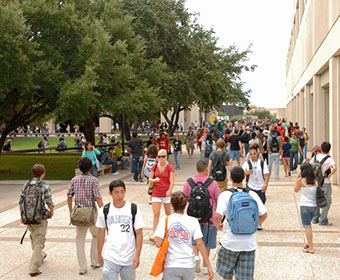
(March 19, 2018) -- The University of Texas System Board of Regents voted this afternoon to approve tuition and fees proposals for its academic institutions, including UTSA, for the next two academic years.
UTSA’s proposal generates additional funds to support student success programs, covering needs such as advising, technology and the First-Year Experience program, among others. Additional revenue will be allocated to financial aid, filling gaps in aid packages for low and middle-income students to ensure UTSA’s neediest students can continue to pursue their education. UTSA’s tuition increases were some of the lowest across the U.T. System.
The proposal process included consultations with the Student Government Association (SGA), local elected officials, and multiple opportunities for open dialogue. UTSA’s Tuition and Fees Committee—comprised of faculty, staff and 30 students from across disciplines—held open meetings throughout the fall semester, including an open forum in November attended by about 100 students.
UTSA’s tuition proposal includes differential tuition rates for students taking upper division undergraduate and graduate courses in the Colleges of Engineering and Business, emulating similar models at several other U.T. System institutions. Differential tuition reflects the higher cost of instruction for these courses, while offsetting impact by reducing or omitting course fees for those students paying differential tuition. In addition, 15 percent of the additional revenue generated by differential tuition will go toward financial aid for students in business and engineering.
In February, the College of Engineering and the College of Business held a series of town halls for students, faculty and staff to learn more about the differential tuition proposals. As a result of these conversations, President Taylor Eighmy elected to delay the implementation of differential tuition until fall 2019 to ensure that all affected students will have the opportunity to benefit from the initiatives the additional revenue will fund prior to graduating.
In addition to the new tuition rates, UTSA's proposal included recommended increases to four student fees: the Athletics Fee, the Transportation Fee, the Student Services Fee and the Automated Services Fee.
The Athletics and Transportation fees were put to a mandated referendum student vote on February 6-7. Neither fee passed, and they were not included in the final proposal presented to the Board of Regents.
Increases to the Student Services and Automated Services fees did not require a student vote and were recommended by separate committees. Both will be implemented at UTSA starting this fall.
The Student Services fee will increase by $0.39/SCH per year over the next two academic years. The fee supports academic support services on campus, including those provided by the Counseling Center, One-Stop Enrollment Center, Enrollment Services, Student Activities, Career Center, Supplemental Instruction, Tutoring Services and the Testing Center, among others.
The Automated Services Fee will increase by $1.50/SCH per year over the next two academic years. Revenues will go toward network maintenance and upgrades, student success technology and software, and additional technology support for early morning, late night and weekend classes.
The proposal also includes a $5 per semester, per student tuition increase allocated to university-wide sustainability initiatives. The SGA requested and approved this suggested allocation. Additional rooftop solar panels, hydration stations, and maintenance of the UTSA community garden are a few examples of the types of projects this allocation will support.
“The input of our campus community played a significant role in shaping our final tuition proposal,” said President Eighmy. “From the beginning, the goal was to enhance our student success programs while ensuring that a UTSA education remains affordable. The many hours the committee spent in deliberations, the student referendum vote and the open forum dialogues were all influential, and helped to ensure our proposal is reflective of our students’ needs.”
Every two years, all University of Texas System institutions are given the opportunity to submit tuition and fee proposals to the U.T. System Board of Regents.
Read more about the UT System Board of Regents’ vote on tuition and fees proposals.
Visit UTSA’s Tuition and Fees website for more information about its 2018-2019 and 2019-2020 proposal.
Connect with UTSA online at Facebook, Twitter, YouTube, Instagram and LinkedIn.
UTSA Today is produced by University Communications and Marketing, the official news source of The University of Texas at San Antonio. Send your feedback to news@utsa.edu. Keep up-to-date on UTSA news by visiting UTSA Today. Connect with UTSA online at Facebook, Twitter, Youtube and Instagram.
Move In To COLFA is strongly recommended for new students in COLFA. It gives you the chance to learn about the Student Success Center, campus resources and meet new friends!
Academic Classroom: Lecture Hall (MH 2.01.10,) McKinney Humanities BldgWe invite you to join us for Birds Up! Downtown, an exciting welcome back event designed to connect students with the different departments at the Downtown Campus. Students will have the opportunity to learn about some of the departments on campus, gain access to different resources, and collect some giveaways!
Bill Miller PlazaCome and celebrate this year's homecoming at the Downtown Campus with food, games, giveaways, music, and more. We look forward to seeing your Roadrunner Spirit!
Bill Miller PlazaThe University of Texas at San Antonio is dedicated to the advancement of knowledge through research and discovery, teaching and learning, community engagement and public service. As an institution of access and excellence, UTSA embraces multicultural traditions and serves as a center for intellectual and creative resources as well as a catalyst for socioeconomic development and the commercialization of intellectual property - for Texas, the nation and the world.
To be a premier public research university, providing access to educational excellence and preparing citizen leaders for the global environment.
We encourage an environment of dialogue and discovery, where integrity, excellence, respect, collaboration and innovation are fostered.